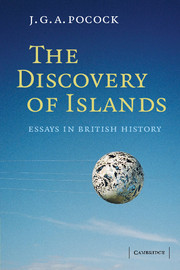Book contents
- Frontmatter
- Contents
- Preface and acknowledgements
- Note on bibliographies
- PART I THE FIELD PROPOSED
- PART II THE THREE KINGDOMS AND THE ENGLISH PROBLEM
- 3 The field enlarged: an introduction (2004)
- 4 Two kingdoms and three histories? Political thought in British contexts (1994)
- 5 The Atlantic archipelago and the War of the Three Kingdoms (1996)
- 6 The Third Kingdom in its history (2000)
- PART III EMPIRE AND REBELLION IN THE FIRST AGE OF UNION
- PART IV NEW ZEALAND IN THE STRANGE MULTIPLICITY
- PART V BRITAIN, EUROPE AND POST-MODERN HISTORY
- Bibliographies
- Index
3 - The field enlarged: an introduction (2004)
Published online by Cambridge University Press: 05 June 2012
- Frontmatter
- Contents
- Preface and acknowledgements
- Note on bibliographies
- PART I THE FIELD PROPOSED
- PART II THE THREE KINGDOMS AND THE ENGLISH PROBLEM
- 3 The field enlarged: an introduction (2004)
- 4 Two kingdoms and three histories? Political thought in British contexts (1994)
- 5 The Atlantic archipelago and the War of the Three Kingdoms (1996)
- 6 The Third Kingdom in its history (2000)
- PART III EMPIRE AND REBELLION IN THE FIRST AGE OF UNION
- PART IV NEW ZEALAND IN THE STRANGE MULTIPLICITY
- PART V BRITAIN, EUROPE AND POST-MODERN HISTORY
- Bibliographies
- Index
Summary
An essay pursuing the themes proposed in 1974 appeared eight years later. It tentatively explored the relations between a kingdom and its marches, since British history was to entail the expansion of medieval and early modern states into lands where human society had been otherwise organized. It is not reprinted here, since this volume aims to present essays written after the ‘new British history’ had been taken up by other hands – a process belonging on the whole to the 1990s and after. The previous decade appears in retrospect a time of profound change in both Britain and New Zealand, as globalized economies and their politics replaced industrial social democracy, accompanied by the administrations of Margaret Thatcher in Britain and David Lange and Roger Douglas in New Zealand. In Britain, it produced a literature of disorientation, in which both a known history and its implied future were said to have been lost, and the turn towards Europe was enjoined on terms which left it unclear whether this implied the acquisition of a new history or the abandonment of any history distinctively British or English. Among professional historians, however, it was a time of exciting revisions, in which the pasts of state and church, nation and empire, were better understood when seen as precarious and exposed to multiple contingencies. This volume intends neither criticism nor apology for what has been going on in the academy, whatever may be said of public intellectuals.
Information
- Type
- Chapter
- Information
- The Discovery of Islands , pp. 47 - 57Publisher: Cambridge University PressPrint publication year: 2005
